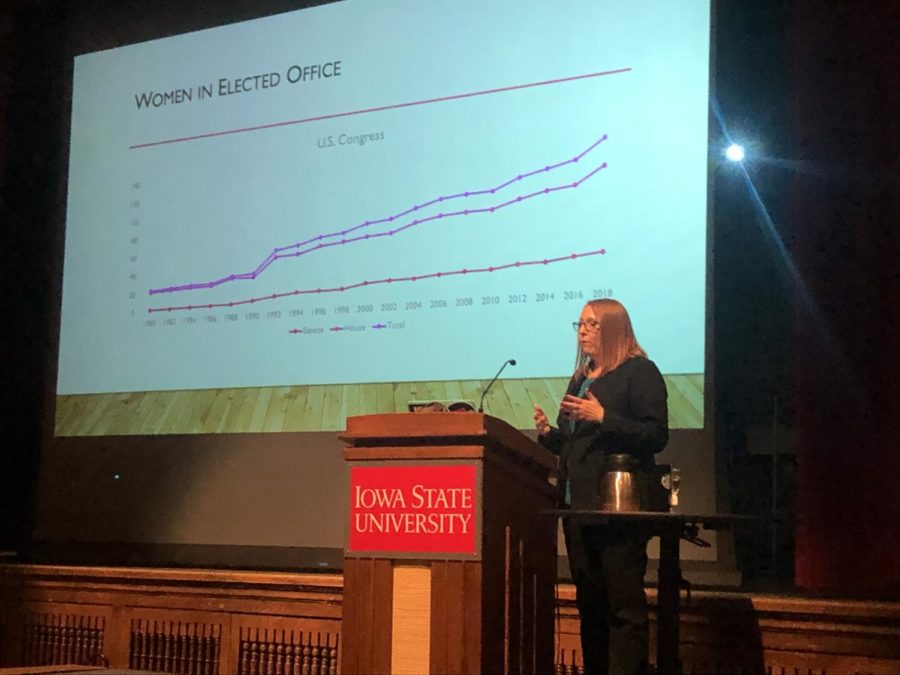- News
- News / Politics And Administration
- News / Politics And Administration / Campus
- News / Politics And Administration / City
- News / Politics And Administration / State
Professor talks struggles women face in seeking office
Katherine Kealey/ Iowa State Daily
Kelly Winfrey, assistant professor of journalism and coordinator of research and outreach for the Carrie Chapman Catt Center for Women and Politics, discussed the issues women face when seeking elected office in a lecture Oct. 10.
October 10, 2019
The issues women face when seeking elected office were discussed in a lecture Thursday at Iowa State.
Kelly Winfrey, assistant professor of journalism and coordinator of research and outreach for the Carrie Chapman Catt Center for Women and Politics, presented on the subject.
“I want to see more women in public office,” Winfrey said in beginning her lecture.
Women represent just over 50 percent of the U.S. population, but less than a quarter of people in Congress. Winfrey said she was baffled by this. She has used her background in communications to gather research about how to get more women into politics, as well as how to get them to win.
Throughout history, the number of women in politics has grown, but the overall numbers are still relatively low. Women are 18 percent of American governors, and there has been a total of 44 women who have served as a governor in American history.
“Those numbers are not representative of the number of women in this country, and I think it is important for a representative government to look like the people it represents,” Winfrey said. “I mean that in gender diversity, racial diversity and cultural ethnic diversity, and research supports the idea that when you have diverse groups making decisions, they make better decisions.”
There are two main reasons why there are so few women in politics, Winfrey said. The first reason she gave is women do not run in high enough numbers, the second reason is sexism and gender stereotypes prevent them from winning.
“Women are believed to be compassionate, gentle, warm, sensitive, emotional, talkative and cautious,” Winfrey said. “Masculine traits, those usually associated with men, consist of tough, aggressive, stern, coarse, competitive. The problem is when we think of leadership traits, too often we think of masculine traits.”
Winfrey said she has found these assumptions about leadership are most commonly found regarding positions of power, such as being president or governor. This is the problem — women are too often grouped into a category of having traits not fit for leadership positions.
These assumptions can be found in what political issues are men and women’s strong-suits. It is assumed by voters women are better in areas such as health care and assisting the poor, whereas men are thought to be better at handling issues of military and security.
“This isn’t to say that men are this way because they are good at those issues, or women are this way and are good at those issues,” Winfrey said. “It is that voters perceive — particularly when there is not a lot of information — that’s how men and women are.”
This situation is called the “double bind,” and Winfrey found that this was an issue during the 2008 election with Hilary Clinton and Sarah Palin.
“Excuse me — but it is appropriate — it’s bitch or the ditz,” Winfrey said.
Winfrey discussed how Clinton was seen as too masculine and not kind enough, whereas Palin was heavily sexualized. Winfrey said she believes this is the issue: women are being characterized by how they look, not what they stand for.
She then showed three campaign ads of women politicians running for various positions and reactions to the ads.
One ad showed images of a woman breastfeeding while discussing the issues of dangerous chemicals in children’s bottles. This ad received both negative and positive reactions. Response statements from people who liked her included “she cares” and “family,” whereas those opposed said things like “inappropriate” and “breastfeeding” as things they did not like about her.
Winfrey said this politician broke all the “rules” doing this, and although this was an interesting strategy, numbers show it is not a winning one. She said there is no one winning strategy for women.
“Women are trying to straddle the fence and some people love it and some people hate it, and you know to win an election you need 51 percent to win,” Winfrey said. So you need to get not just your party but a fair number of the others as well.”
Rachel Junck, senior in chemical engineering, is running for Ames City Council and attended Winfrey’s speech because she said she believes these issues pertain to her and hoped to learn as much as she could from Winfrey.
“I experienced the feeling of not being qualified enough, this is a feeling a lot of women have,” Junck said. “They [women] have to be told multiple times that they are qualified, and they should run. So that was something that I personally had to overcome when running for City council.”
Junck said she solved this struggle by encouragement from those around her, and that is exactly what Winfrey said she believes people should be doing more of, as well as applying the same standards for men and women.
“Be aware of your own your own assumptions, and ask yourself if you apply the same standards to a male candidate,” Winfrey said. “Would I ask if he is likable, did I ask if he is likable and if the answer is no then maybe you should.”

















